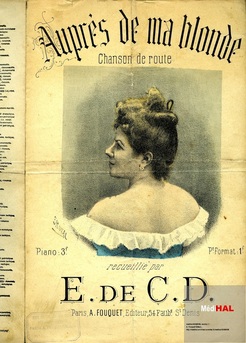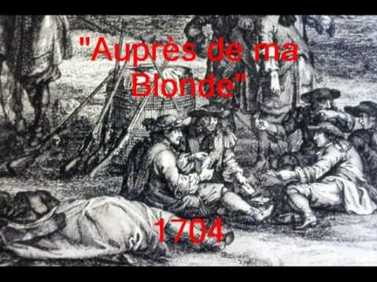Auprès de ma blonde
|
"Auprès de ma blonde" is a French military march. The first version known dates from 1704 and was titled "Le prisonnier de Hollande".
André Joubert du Collet is supposed to be the composer of the song, but it is possible that it was derivated from a melody dating somewhere in the 16th century. André Joubert du Collet was a French lieutenant of the royal marine. During the war that the Dutch fought against France and England (1672 - 1679, called the Dutch War), he was taken prisoner of the Dutch during a raid they carried out on the Island of Noirmoutier, July 1674. He was kept in captivity in Amsterdam, The Netherlands, during a period of two years, together with other prisoners. They were only released through the payment of a ransom by King Louis XIV. In order to thank the king André Joubert du Collet offered him the song he had composed in captivity: "Le prisonnier de Hollande". The chorus of the melody refers to his wife, to whose memory he had written the song. The march quickly became popular among the military troups. Reports are existing that the soldiers of the Duc de Villars, maréchal de France (1653-1734) |
were singing it while entering Quesnoy in 1712. As the song became the march tune of the Régiment de Champagne, it soon spread among the common people.
|
In some variants on the original lyrics the laurels of the first stanza sometimes are replaced by "lilacs", the symbolic military laurels leaving room for the pastoral image of lilac flowers.
In 1966 an English version of the song appeared, sung by Elvis Presley in the movie "Double Trouble". This version was distributed in France under the name "Croisière Surprise" in 1967. In France itself, Auprès de ma blonde has been performed by numerous artists. Sources: http://www.chansons-net.com/index.php?param1=E142.php http://kda.wikia.com/wiki/Aupr%C3%A8s_de_ma_blonde http://fr.wikipedia.org/wiki/Aupr%C3%A8s_de_ma_blonde Click the link to hear Auprès de ma blonde on accordeon |


